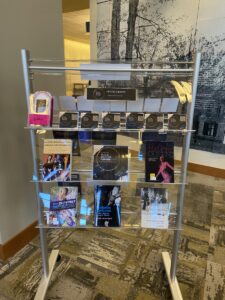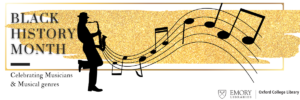In honor of Black History Month, the Oxford College Library is proud to present our book display centered around African American music. We chose this specific focus to take advantage of the expertise of the Oxford faculty. This display is the product of a collaboration between Emory University faculty/staff members Jacob Lackner, Winta Bahlibi, Professor Marvin McNeill, and Professor Emorja Roberson. They graciously donated their thoughts, their recommendations, and their time to make this possible.
 “Black music consists of African musical traits and practice that survived and played a major role in the development and elaboration of African-American music. From the double-entendres found in the text of the Negro spirituals, to the polyrhythmic nature of hip-hop – Black music is American music. Louis Armstrong, a jazz musician from New Orleans, fused Cajun and Creole cultures in his music. Marian Anderson, world-class contralto, rendered an outdoor performance on the steps of the Lincoln Memorial after being denied the opportunity to perform in Constitution Hall. During the Civil Rights Era, Mahalia Jackson became known for her gospel arrangements, “Take My Hand, Precious Lord” and “We Shall Overcome” as various ethnicities banned together in the fight for equality. Regardless of the genre or era, Black music stems from an experience.
“Black music consists of African musical traits and practice that survived and played a major role in the development and elaboration of African-American music. From the double-entendres found in the text of the Negro spirituals, to the polyrhythmic nature of hip-hop – Black music is American music. Louis Armstrong, a jazz musician from New Orleans, fused Cajun and Creole cultures in his music. Marian Anderson, world-class contralto, rendered an outdoor performance on the steps of the Lincoln Memorial after being denied the opportunity to perform in Constitution Hall. During the Civil Rights Era, Mahalia Jackson became known for her gospel arrangements, “Take My Hand, Precious Lord” and “We Shall Overcome” as various ethnicities banned together in the fight for equality. Regardless of the genre or era, Black music stems from an experience.
Barack Obama stated, “Let us recognize performers behind this incredible music, which has compelled us to stand up – to dance, to express our faith through song, to march against injustice, and to defend our country’s enduring promise of freedom and opportunity for all.
#BlackMusicMatters – Emorja Roberson”
These genres developed as a reflection of their times. Blues music emerged in the late 1800’s in the aftermath of the Civil War. Black men and women communicated their joys and sorrows of their lives-working hard for little pay. The Blues genre is characterized by its soulful lyrics, impassioned wailing sounds, and a transparent expression of yearning that can be felt. These relatable qualities led to unprecedented popularity, becoming the cornerstone of modern music in America. Even today, performers like Duke Ellington, Etta James, and B.B. King are still household names.
 In the early 1900’s, Jazz arrived as the first truly American musical art form. Classical Jazz became popular in New Orleans, first in the red-light district but then across the entire city. Jazz is made distinct by its combination of blaring trumpets, joyful tone, fusion of cultural styles, and incorporation of the call and response technique found in the Blues. Jazz would eventually arrive in Harlem, New York, as part of the Great Migration. The Harlem Renaissance saw the opening of the Apollo Theater, one of the first major venues to allow Black musicians to perform. Amateur Night could launch-or bury-an emerging career. Artists like Duke Ellington, Ella Fitzgerald, and Cab Calloway would find fame at the Apollo, with later stars including The Jackson 5, Patti LaBelle, and Stevie Wonder.
In the early 1900’s, Jazz arrived as the first truly American musical art form. Classical Jazz became popular in New Orleans, first in the red-light district but then across the entire city. Jazz is made distinct by its combination of blaring trumpets, joyful tone, fusion of cultural styles, and incorporation of the call and response technique found in the Blues. Jazz would eventually arrive in Harlem, New York, as part of the Great Migration. The Harlem Renaissance saw the opening of the Apollo Theater, one of the first major venues to allow Black musicians to perform. Amateur Night could launch-or bury-an emerging career. Artists like Duke Ellington, Ella Fitzgerald, and Cab Calloway would find fame at the Apollo, with later stars including The Jackson 5, Patti LaBelle, and Stevie Wonder.
Our last featured genre is rhythm and blues (R&B). R&B music was a catalyst for social, political, and economic change in America. R&B music has inspired how we dress, think, and even how we speak. R&B grew out of 1950s Chicago. Music labels on Record Row signed black R&B musicians to create the music that would meet the demand of the Black middle class. R7B music inspired social and economic change as record labels witnessed the economic power of Black communities. R&B has also played a vital role in political change with songs like ‘People Get Ready’, ‘This Little Light of Mine’, and ‘What’s going on?’, which opened the conversation on matters regarding civil rights and injustices targeting African American communities. Black music has continued to inspire, educate, and entertain into the modern day, with Black artists finding success in the pop, country, and rap genres.
Thank you for visiting our blog – we hope you stop by the library during the month of February to browse our book display and pick up a playlist from our digital jukebox celebrating some of the most accomplished musicians of all time.
While your here check some some amazing music:
Songs in the Key of Life by Stevie Wonder
My Everything preformed by Anita Baker
Duke Ellington and His Orchestra: Harlem
While this display will only run this month, the Oxford College Library is hard at work building out collection materials related to African American music, as well as pursuing opportunities to collaborate with our faculty inside and outside the classroom.




It’s really great. Thank you for providing a quality article.
These are some nice blog post
Nice blog! Celebrating African American music is a powerful way to honor the rich cultural contributions of the community.
Great Post..!! This exhibit beautifully celebrates African American music, highlighting its profound impact on culture and society. It’s a testament to the rich and vibrant history of Black musicianship.
I absolutely love how Black History Month celebrates the rich history and contributions of African American music. From jazz to hip hop, this genre has influenced and shaped music worldwide. It’s crucial to recognize and appreciate the incredible artists who have paved the way for today’s diverse music industry. Let the celebration continue!